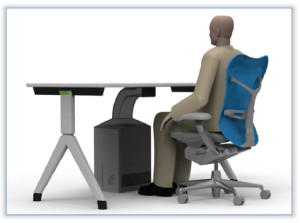Cool Technology: ARPA-E awards $3.2 to Syracuse University, SyracuseCoE researchers for ‘personal air-conditioning’
Syracuse University was recently awarded a $3.2 million grant from the Energy Department’s Advanced Research Projects Agency-Energy (ARPA-E) to develop innovative new technologies that regulate temperatures for each person inside an office building, rather than heating or cooling the whole building itself.
SyracuseCoE scientists aided the project team in the development of the proposal and will be key players in the execution of the research, including bringing the technolog
y to market.
Syracuse University’s Professor H. Ezzat Khalifa will lead the team of researchers to develop a near-range micro-environmental control system. The system will provide heating and cooling via a box about the size of an old desktop computer. A high-efficiency micro vapor compression system will utilize an evaporator embedded in a phase-change material. This material will store the heating or cooling produced by the micro vapor compression system at night, releasing it as a breeze to make occupants more comfortable during the day.
“This award allows us to develop a transformative technology that could alter the way we approach heating and cooling buildings.” says Dr. Khalifa, NYSTAR Distinguished Professor, Department Chair of Mechanical and Aerospace Engineering at Syracuse University. “Ultimately this system will create a much more affordable and energy efficient way to ensure individual occupant comfort.”
In addition to researchers at Syracuse University and SyracuseCoE, the project includes United Technologies Research Center, Air Innovations, Bush Technical LLC and Cornell University. Substantial financial contributions have also been given by Syracuse University, the partners, ESD (Empire State Development) and NYSERDA (New York State Energy Research and Development Authority).
Prof. Khalifa and colleagues join the country’s top scientists and engineers in advancing ARPA-E’s mission of developing transformative energy technologies that enhance the economic and energy security of the United States. ARPA-E’s Delivering Efficient Local Thermal Amenities (DELTA) program plans to provide $30 million to support 11 project teams in developing technologies that can regulate temperatures focused on a building’s occupants and not the overall building.
The team hopes to create an affordable system that can condition only the space immediately surrounding an individual user rather than all of the space in an office, saving a great deal of energy. Such an innovation could revolutionize the way offices are heated and cooled.

